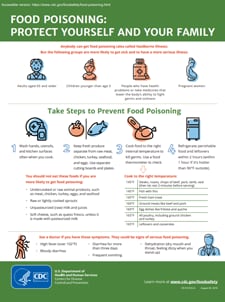Food Poisoning Basics
Learn about the causes, signs, and symptoms of food poisoning and tips for how to prevent yourself and your family from getting sick.
KEY FACTS:
- Every year, about 1 in 6 Americans (or 48 million people) get sick, 128,000 are hospitalized, and 3,000 die of foodborne diseases.
- Anybody can get food poisoning (also called foodborne illness).
- But the following groups are more likely to get sick and to have a more serious illness:

Adults aged 65 and older

Children younger than age 5

People whose immune systems are weakened by health conditions or medicine used to treat them, including people with diabetes, liver or kidney disease, HIV/AIDS, or cancer

Pregnant women
You should not eat these foods if you are more likely to get food poisoning:
- Undercooked or raw animal products, such as meat, chicken, turkey, eggs, seafood
- Raw or lightly cooked sprouts
- Unpasteurized (raw) milk and juices
- Soft cheese, such as queso fresco, unless it is made with pasteurized milk

Wash hands, utensils, and kitchen surfaces often when you cook.

Keep fresh produce separate from raw meat, chicken, turkey, seafood, and eggs. Use separate cutting boards and plates.

Cook food to a safe internal temperature to kill germs. Use a food thermometer to check.

Refrigerate perishable food within 2 hours (or 1 hour if food is exposed to temperatures above 90°F, like a picnic or hot car). Examples of perishable food include meat, chicken, turkey, seafood, eggs, dairy, cut fruit, cooked rice, and leftovers.
